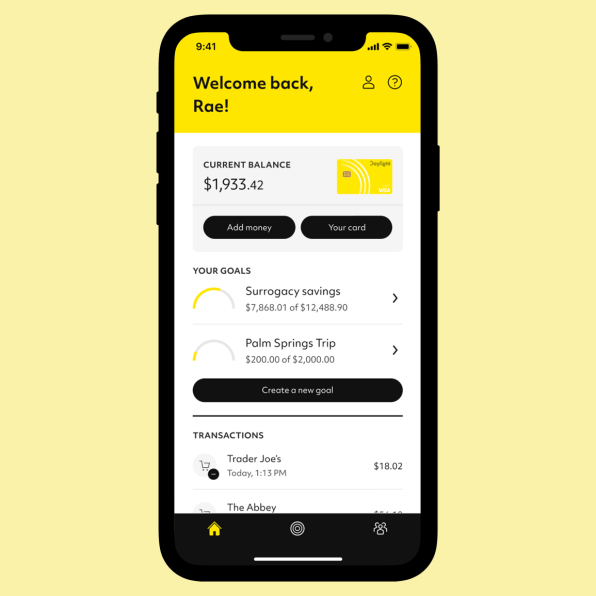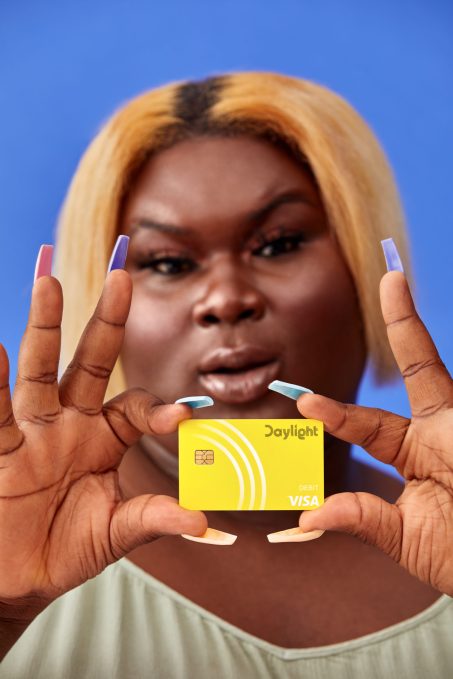A day after a bill that would codify same-sex marriage in the U.S. cleared a key hurdle in the Senate, Daylight, a digital bank that pitches itself as LGBTQIA+-friendly, closed a $15 million Series A round led by Anthemis Group with participation from CMFG Ventures, Kapor Capital, Citi Ventures and Gaingels.
Daylight Co-founder and CEO Rob Curtis says that the new capital will be used to, in his words, “build the financial products and services to help queer people live their best lives” — starting with a subscription plan called Daylight Grow designed to help prospective queer families with financial planning.
“There are over 30 million LGBTQ+ Americans with a spending power of around $1 trillion and yet the community lacks access to the suite of products and services they need to live their best lives,” Curtis told TechCrunch in an email interview. “Daylight was created with a single mission: to build the financial products and services to help queer people live their best lives.”
Curtis co-launched Daylight with Billie Simmons, a trans woman, and Paul Barnes-Hoggett in early 2020. Prior to starting Daylight, Curtis worked for several organizations supporting the LGBTQ+ lifestyle and causes, including Gaydar, a dating site for gay and bisexual men. He also co-founded Squad Social and Helsa Helps, startups aiming to improve access to mental health for members in the LGBTQ+ community.
Daylight is a part of wave of recent neobanks — bank-like fintech companies that operate online, without physical branch networks — organized around aspirational causes and missions. Rapper Killer Mike’s Greenwood aims to help Black and Latinx communities build generational wealth. Majority, which launched the same year as Greenwood (2020), seeks to build banking tools and resources for immigrants. Purpose Banking, Aspiration and One all promise to never let deposits fund fossil fuels.

Image Credits: Daylight
With the wealth of ethics-forward fintechs out there, why found a neobank for LGBTQ+ people? According to Curtis, most mainstream banking products simply weren’t designed with U.S.-based queer folks in mind. (Pride Bank, a neobank with similarly queer-forward branding, is based in Brazil.) For example, Daylight provides debit cards with customers’ chosen names, which aren’t always the same as what’s on their ID. It offers members 10% cash back every time they spend with a queer and allied business that Daylight has partnered with. And it offers guided goals for gender-affirming procedures like top surgery and facial feminization.
Beyond cash management features like a checking account, free ATMs and the ability for members to get paid two days early, Daylight hosts communities where customers can ask questions around “queer financial literacy,” such as family planning, in what Curtis claims is a safe and supportive environment.
“At Daylight, our mission has always been to break down the financial barriers that hold LGBTQ+ people back … In this post-Dobbs world, Daylight’s commitment to supporting queer families has never been more necessary,” Curtis said, referring to the Supreme Court case that legalized abortion bans in the U.S. and opened the door to legal challenges of marriage equality.
Certainly, members of the LGBTQ+ community face fiscal challenges that many cisgender, straight adults never do. Some suffer the consequences of being kicked out of their homes by unaccepting parents. Others find themselves on the hook for HIV/AIDS treatment, hormone therapy and fertility procedures. Most queer people gravitate toward pricey metro areas because they’re more accepting and progressive, and many queer people lack a safety net — whether because they lack family support or don’t have children who can take care of them.
For those reasons and others, LGBTQ+ people frequently earn less, live in poverty and have less in pension savings than their cisgender counterparts. The situation for transgender people is particularly dire, with the poverty rate for the transgender community in the U.S. averaging around 30% — close to double the rate of cisgender adults — according to a 2019 study from the UCLA School of Law’s Williams Institute. Transgender people are also twice as likely to be unemployed and four times as likely to have a household income below $10,000; the 2021 U.S. federal poverty was $12,880.
The aforementioned Daylight Grow isn’t a cure-all, but targets the major hurdles many queer couples encounter in starting a family. This is a significant portion of Daylight’s customers. A recent poll by the Family Equality Council found that nearly two-thirds of LGBTQ millennials — 63% — are considering becoming parents for the first time or expanding their family.

Image Credits: Daylight
When the product launches in early 2023, Simmons says that Daylight Grow will offer a personalized “family creation plan” covering financial, legal and logistical milestones tailored to individual states and needs, “family planning concierges” to provide financial advice and logistical support, a “family-building marketplace” with vetted family attorney networks and recommendations for IVF and surrogacy clinics, and in-person financial and fertility education events.
“Family creation is a major life event for queer people and the challenges we face are increasingly more complex than those for non-LGBTQ people,” Simmons told TechCrunch via email. “The launch of Daylight Grow will help queer people navigate through the complex legal and financial challenges involved with starting a family, making it faster and easier to start a family, and unlocking critical intergenerational wealth for our community.”
Daylight Grow will also offer access to family-building loans, a potential game-changer for queer customers who’ve dealt with discrimination from traditional banks. According to a 2019 study, same-sex borrowers were 73% more likely to be denied a mortgage or be approved for a mortgage at a higher-than-average interest rate.
Daylight plans to offer hundreds of free Grow subscriptions to low-income, marginalized families in states where LGBTQ+ rights are under significant legal attack, Curtis said. Which states — and Grow’s pricing — are still being decided.
Daylight has raised $20 million in capital to date. Curtis wouldn’t answer questions about revenue and hiring plans, preferring, at least for now, to keep the focus on the company’s core mission.
Daylight, the LGBTQ+ neobank, raises cash to launch subscription plan for family planning by Kyle Wiggers originally published on TechCrunch







